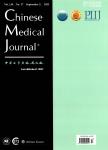Beneficial Effect of Moderately Increasing Hypothermic Machine Perfusion Pressure on Donor after Cardiac Death Renal Transplantation
Beneficial Effect of Moderately Increasing Hypothermic Machine Perfusion Pressure on Donor after Cardiac Death Renal Transplantation作者机构:Department of Renal TransplantationNephropathy HospitalThe First Affiliated Hospital of Xi'an Jiaotong UniversityXi'anShaanxi 710061China Institute of Organ TransplantationXi'an Jiaotong UniversityXi'anShaanxi 710061China
出 版 物:《Chinese Medical Journal》 (中华医学杂志(英文版))
年 卷 期:2018年第131卷第22期
页 面:2676-2682页
核心收录:
学科分类:10[医学]
基 金:grants from the Fundamental Research Funds for the Central Universities (No.xjj2018091) Major Clinical Research Projects of the First Affiliated Hospital of Xi'an Jiaotong University (No.XJTU 1AF-CRF-2015-005) Scientific and Technological Breakthrough in Social Development of Shaanxi Province (No.2016SF-246) National Natural Science Foundation of China (No.81670681and 81760137)
主 题:Delayed Graft Function Donor after Cardiac Death Hypothermic Machine Perfusion Kidney Transplantation
摘 要:Background:Vascular resistance and flow rate during hypotherrnic machine perfusion (HMP)of kidneys is correlated with graft function. We aimed to determine the effects of increasing HMP pressure versus maintaining the initial pressure on kidney transplantation outcomes. Methods:We retrospectively reviewed the data of 76 primary transplantation patients who received HMP-preserved kidneys from 48 donors after cardiac death between September 1,2013,and August 31,*** pressure was increased from 30 to 40mmHg (1mmHg =0.133kPa)in kidneys with poor flow and/or vascular resistance (increased pressure [IP]group;36 patients);otherwise,the initial pressure was maintained (constant pressure group;40 patients).Finally,the clinical characteristics and transplantation outcomes in both groups were assessed. Results:Delayed graft function (DGF)incidence,1-year allograft,patient survival,kidney function recovery time,and serum creatinine level on day 30 were similar in both groups,with improved flow and resistance in the IP *** patients with DGF,kidney function recovery time and DGF duration were ameliorated in the IP *** logistic regression analysis revealed that donor hypertension (odds ratio [OR]:1.43,95%confidence interval [CI]:1.02-2.06,P =0.035),donor terminal serum creatinine (OR:1.27,95%C7:1.06-1.62,P =0.023),warm ischemic time (OR:3.45,95%CI:1.97-6.37,P =0.002),and terminal resistance (OR:3.12,95%CI:1.76-6.09,P =0.012)were independent predictors of *** proportional hazards analysis showed that terminal resistance (hazard ratio:2.06,95%C1:1.32-5.16,P =0.032)significantly affected graft survival. Conclusion:Increased HMP pressure improves graft perfusion but does not affect DGF incidence or 1-year graft survival.



